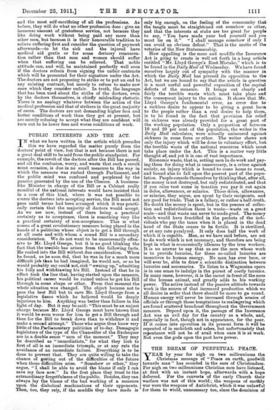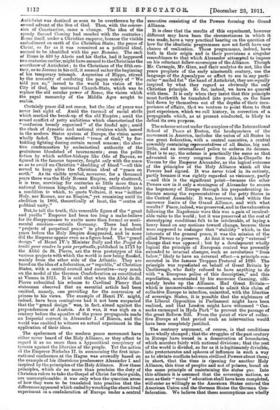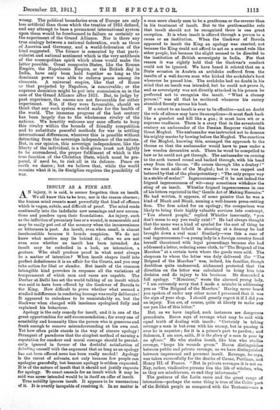THE DREAM OF PERPETUAL PEACE.
yEAR by year for nigh on two millenniums the Christmas message of " Peace on earth, goodwill towards man " has sounded in the ears of Christendom. For nigh on two millenniums Christian men have listened, at first with an instant hope, afterwards with a hope deferred. For the can.verts of the early Church their warfare was not of this world ; the weapons of earthly war were the weapons of Antichrist, which it was unlawful for them to wield, unnecessary too, since the dominion of Antichrist was destined so soon to be overthrown by the second advent of the Son of God. Then, with the conver- sion of Constantine, came a change. The idea of the speedy Second Coming had receded with the centuries ; Rome itself, under a Christian emperor, became the visible embodiment on earth of the Christian State ; the peace of Christ, so far as it was conceived as a political ideal, seemed to be identified with the per Romano,. The sack of Rome in 410 by Alaric and his Goths, had it happened two centuries earlier, might have seemed to theChristians the overthrow of Antichrist ; to the Christians of the fifth cen- tury, as to Jerome in his cell, it seemed rather the beginning of his temporary triumph. Augustine of Hippo, stirred by the necessity of confuting the pagan outcry of " We told you so," issued to the world his vision of the City of God, the universal Church-State, which was to replace the old secular power of Rome, the vision which the papal monarchy of the Middle Ages sought to realize.
Certainly peace did not ensue, but the idea of peace was never lostsight of. Amid the turmoil of racial strife which marked the break-up of the old Empire ; amid the armed conflict of petty ambitions which characterized the " confusion loosely organized " of the feudal age ; amid the clash of dynastic and national rivalries which issued in the modern States system of Europe, the vision never wholly faded. The mediaeval " truce of God," by for- bidding fighting during certain sacred seasons ; the abor- tive condemnation by ecclesiastical authority of the gratuitous bloodshed of tournaments ; even the polite fiction by which soldier-bishops like Odo of Bayeux, as figured in the famous tapestry, fought only with the mace so as to avoid un-Christian " shedding of blood "—all this served to keep alive the Christian ideal of "peace on earth." As its visible symbol, moreover, for a thousand rears there was the Holy Roman Empire, early shattered, it is true, surviving for centuries as little more than a national German kingship, and sinking ultimately into a condition in which, to quote Voltaire, it was "neither Holy, nor Roman, nor an Empire," yet remaining until its abolition in 1806, theoretically at least, the " centre of political unity."
But, to tell the truth, this venerable figure of the " great and pacific " Emperor had been too long a make-believe for its disappearance to excite more than formal or senti- mental emotion—outside Germany. There had been " projects of perpetual peace" in plenty for a hundred years before the Holy Empire disappeared, and in none did the Emperor appear even as a figure-head. The "grand design" of Henri IV.'s Minister Sully and the Projet do traite pour rendre la Fax perpetuelle, published in 1713 by the Abbe de St. Pierre, are the true prototypes of the various projects with which the world is now being flooded, mainly from the other side -of the Atlantic. They are based on the idea of a federation, or " republic," of Christian States, with a central council and executive—very much on the model of the German Confederation as constituted at Vienna in 1815. It is said that when the Abbe de St. Pierre submitted his scheme to Cardinal Fleury that statesman observed that an essential article had been omitted, namely, one providing for the conversion of princes to his views. The example of Henri IV. might, indeed, have been contagious had it not been suspected that the " grand design ' was, in fact, aimed against the preponderance of Austria. As it was, it was nigh on a century before the apostles of the peace propaganda made an Imperial convert in Alexander I. of Russia, and the world was enabled to witness an actual experiment in the application of their ideas.
The spokesmen of the modern peace movement have either never heard of the Holy Alliance, or they affect to regard it as no more than a hypocritical conspiracy of tyrants against the liberties of the people. Yet the action of the Emperor Nicholas II. in summoning the first inter- national conference at the Hague was avowedly based on the example of his illustrious predecessor Alexander I. and inspired by the principles of the Holy Alliance. Now these principles, which do no more than proclaim the duty of Christian rulers to take the Gospel of Christ for their guide, are unexceptionable: it was only when the question arose of how they were to be translated into practice that the differences appeared which ended bywreckingthe short-lived experiment in a confederation of Europe under a central executive consisting of the Powers forming the Grand Alliance.
It is clear that the results of this experiment, however different may have been the circumstances in which it was made, have a very practical bearing on the question of how far the idealistic programmes now set forth have any chance of realization. These programmes, indeed, have both in their origin and in their provisions a singular resemblance to that which Alexander attempted to impose on his reluctant fellow-sovereigns of the Alliance. Though Mr. Carnegie, Mr. Ginn, and their acolytes do not, like the peace prophets of the early nineteenth century, use the language of the Apocalypse or affect to see in any parti- cular " mailed fist " the hand of Antichrist, they are equally inspired by what they regard as obviously the only Christian principle. So far, indeed, we have no quarrel with them. It is only when they insist that this principle must forthwith be translated into practice, on the lines laid down by themselves out of the depths of their inex- perience of affairs, that we venture to point them to that past experience, which we call history, in correction of a propaganda which, as at present conducted, is likely to defeat its own purpose.
The scheme set out under the auspices of the International School of Peace at Boston, the headquarters of the movement in America, includes the union of all States in one great federation, with a central executive, a central assembly containing representatives of all States, big and little, and an international police to enforce its decrees. That is to say, the scheme is practically the same as that advocated in every congress from Aix-la-Chapelle to Verona by the Emperor Alexander, as the logical outcome of the principles of the Holy Alliance which all the Powers had signed. It was never tried in its entirety, partly because it was rightly regarded as visionary, partly —and this is the significant point—because the other Powers saw in it only a stratagem of Alexander to secure the hegemony of Europe through his preponderating in- fluence among the representatives of the petty States in the Central Assembly. It was, however, tried within the narrower limits of the Grand Alliance, and with what results ? Peace, indeed, was preserved, and in the exhaustion following the Napoleonic wars this was again of incalcul- able value to the world; but it was preserved at the cost of stereotyping conditions felt to be intolerable, of laying a heavy hand on any motions toward change, because these were supposed to endanger that " stability " which, in the interests of the general peace, it was the mission of the allied Powers to preserve. At first it was only " external " change that was opposed ; but by a development wholly logical the principle of European control was presently extended to internal changes, such as revolutions "from below," likely to have an external effect—a principle con- secrated in the famous Troppau Protocol of 1820. The principle was repudiated on behalf of Great Britain by Castlereagh, who flatly refused to have anything to do with " a, European police of this description," and this repudiation, accentuated by his successor Canning, ulti- mately broke up the Alliance. Had Great Britain— which is inconceivable—consented to admit this claim of collective Europe to interfere, uninvited, with the liberties of sovereign States, it is possible that the nightmare of the Liberal Opposition in Parliament might have been realized, and that London might have witnessed " Coo- sacks encamped in Hyde Park " to prevent the passage of the great Reform Bill. From the point of view of collec- tive Europe at that period such an intervention would have been completely justified.
The contrary argument, of course, is that conditions have wholly changed ; that the struggles of the past century in Europe have issued in a demarcation of boundaries, which marches fairly with national divisions ; that the rest of the world is divided, so far as it is legitimately divisible, into protectorates and spheres of influence in such a way as to obviate conflicts between civilized Powers about them; in short, that the time is ripening for another Holy Alliance, this time of peoples and not of princes, based on the same principle of maintaining the status quo. Into this alliance it is assumed that the sovereign nations, so soon as their " moral " education shall have been completed, will enter as willingly as the American States entered the American Union and the German States the German Con- federation. We believe that these assumptions are wholly wrong. The political boundaries even of Europe are only less artificial than those which the treaties of 1815 defined, and any attempt to base a permanent international system upon them would be foredoomed to failure as certainly as the experiment of the Grand Alliance. Nor is there any true analogy between a national federation, such as those of America and Germany, and a world-federation of the kind suggested. The former is cemented by that pax ti- cularist and national sentiment which is the very antithesis of the cosmopolitan spirit which alone would make the latter possible. Great composite States, like the Roman Empire, the Napoleonic Empire, or the British Raj in India, have only been held together so long as the dominant power was able to enforce peace among its elements. A universal empire, like that of Rome or that projected by Napoleon, is conceivable ; or the supreme dominion might be put into commission as in the case of the Grand Alliance after 1815. But, to judge by past experience, the omens are not favourable for either experiment. Nor, if they were favourable, should we think that any such system would make for the health of the world. The immense progress of the last century has been largely due to the wholesome rivalry of the nations. We heartily welcome any sane efforts to keep this rivalry within the bounds of friendly competition and to substitute peaceful methods for war in settling international differences, wherever this is possible without detracting from the sovereign independence of the nations. But, in our opinion, this sovereign independence, like the liberty of the individual, is a God-given trust not lightly to be surrendered, the proper fulfilment of which is the true function of the Christian State, which must be pre- pared, if need be, to risk all in its defence. Peace on earth we desire ; but we believe that, while the world remains what it is, its discipline requires the possibility of war.




































 Previous page
Previous page